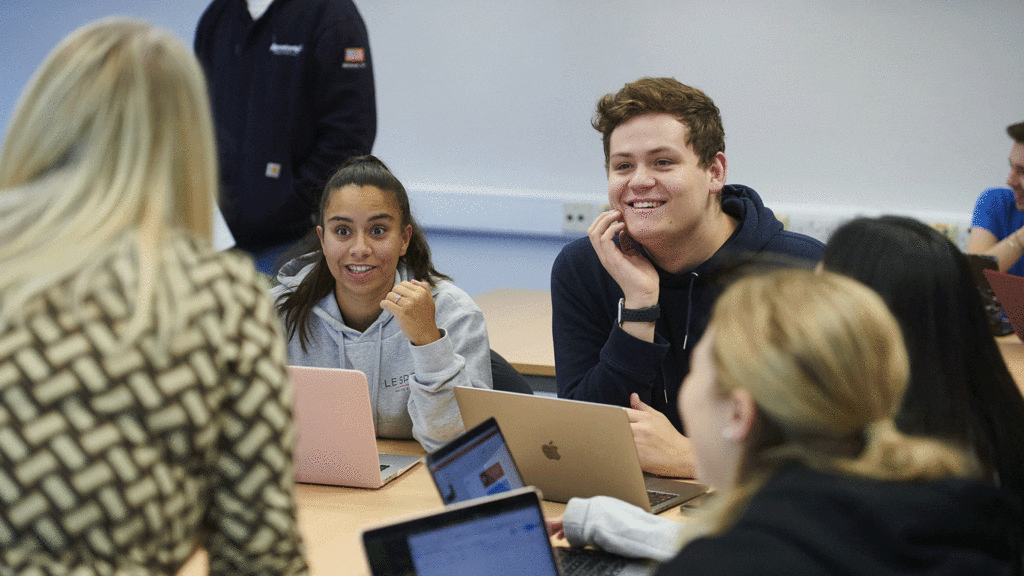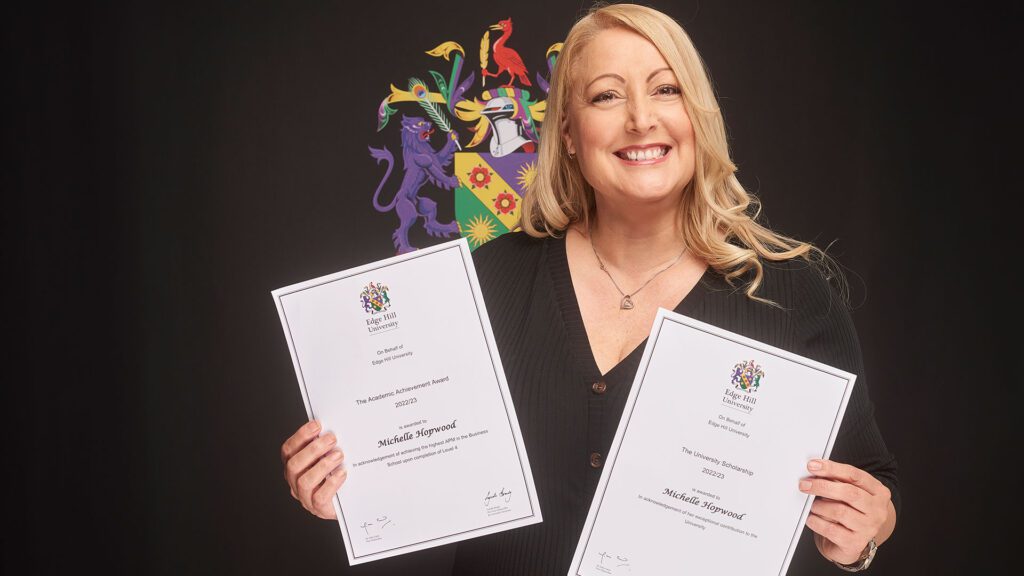Economics BSc (Hons)
UCAS code: L100
How is economics used to identify market trends? How does this influence key decisions made in finance, business, social policy and government? You’ll learn how to answer these questions and more on our economics degree with a focus on sustainable economic policy.
Overview
| Course length: | 3 years full-time |
|---|---|
| Start dates: | September 2025 September 2026 |
| Location: | Edge Hill University (full-time) |
| Example offers: | BBC-BBB (A Level) or DMM (BTEC) View full entry criteria |
| Subject(s): | Economics |
| Faculty: | Arts and Sciences |
| Department: | Business School |

Interested in how economics influences and impacts political decision? With a focus on sustainable economic policy, our BSc (Hons) Economics degree draws upon key economic theory and econometric approaches, enabling you to model and evaluate contemporary economic policy in today’s global environment. You’ll gain the skills to review government and political policy and assess the impact on finance, business and social strategies.
You will utilise live data from recognised economic databases and use industry standard software to analyse and evaluate current economic data. This will result in you developing a rational, informed and analytical discussion on contemporary economic situations.
Taking an applied approach, you will build your knowledge in micro-economic and macro-economic theory and strengthen your skills in understanding economic thought.
Economics is about understanding and exploring the dynamic social, business and financial markets that the world operates within. That’s why the modules on the course are designed to provide opportunities for engagement with employment.
As the degree progresses so will your knowledge on economic and econometric theory. There will be an opportunity to carry out a focused research project in an area of interest to further solidify your transferable skills in analysis and evaluation.
Course features
-
Sandwich year option available
-
Studying abroad option available
-
Work placement opportunity
-
Learn a language option available
-
International students can apply
What you'll study
Developing a grounding knowledge in quantitative methods, microeconomic and macroeconomic theory, with an applied economic approach to understanding economic thought, is the focus in Year 1. You will begin to develop your skills in analysing the economic environment.
Year 2 continues with a focus on public economics and sustainable economic policy. You’ll use current econometric approaches to model and evaluate contemporary economic thought. By introducing this sub-discipline of economics, you will develop a range of econometric analytical and evaluative skills. There will be an opportunity to engage with the current economic environment through a work placement.
Year 3 allows you to concentrate on developing your knowledge and understanding of economic theory and advanced econometric theory. There’s also an opportunity to carry out focused research in an area of interest that can help to inform the work environment of your choice.
How you'll study
You will study through lectures, workshops and tutorials, group exercises and on the job learning while on your work placement. You will also have the opportunity to learn from external economics professionals who are invited to teach occasional sessions.
The work placement involves a period working in an external organisation which allows you to put your learning into practice. As well as developing your skills and future learning processes, you will have the opportunity to build relationships with potential employers and gain vital experience for your CV.
How you'll be assessed
We will assess your vocational capability, academic critical thinking and intellectual development throughout the course. Coursework, case studies, problem-solving exercises and exams could be used. You may be assessed individually or in a group.
Who will be teaching you
Edge Hill Business School is home to a thriving research community, hosts a growing international partnership portfolio, and is a member of AACSB International (The Association to Advance Collegiate Schools of Business), the world’s largest management education network.
You will be taught by highly qualified, experienced and enthusiastic academics, including professionally qualified accountants, who research and regularly engage within the wider business and academic environment. Staff are encouraged to specialise in particular subjects so you will benefit from a wide range of knowledge and experience.
Where your course includes optional modules, these are to provide an element of choice within the course curriculum. The availability of optional modules may vary from year to year and will be subject to minimum student numbers being achieved. This means that the availability of specific optional modules cannot be guaranteed. Optional module selection may also be affected by timetabling requirements. Some restrictions on optional module choice or combinations of optional modules may apply.
Entry criteria
Typical offer 112-120 UCAS Tariff points, including either Economics or Mathematics, plus GCSE Mathematics at Grade C or Grade 4 or above, or equivalent.
Please note, for the purposes of economics, a Level 2 numeracy qualification is not considered as equivalent to GCSE Grade C or Grade 4 in Mathematics.
Example offers
| Qualification | Requirement |
|---|---|
| A Level | BBC-BBB. |
| BTEC Extended Diploma (or combination of BTEC QCF qualifications) | Distinction, Merit, Merit (DMM). |
| T Level | Overall grade of Merit. |
| International Baccalaureate (IB) | We are happy to accept IB qualifications which achieve the required number of UCAS Tariff points. |
| Access to Higher Education Diploma | 45 credits at Level 3, for example 15 credits at Distinction and 30 credits at Merit or 24 credits at Distinction and 21 credits at Merit. The required total can be attained from various credit combinations. |
Please note, the above examples may differ from actual offers made. A combination of A Level and BTEC awards may also be accepted.
If you have a minimum of two A Levels (or equivalent), there is no maximum number of qualifications that we will accept UCAS points from. This includes additional qualifications such as Extended Project Qualification (EPQ), AS Levels that haven't been continued to A Level, and General Studies AS or A Level awards.
English language requirements
International students require IELTS 6.0, with a score no lower than 5.5 in each individual component, or an equivalent English language qualification.
If your current level of English is half a band, one band, or one-and-a-half bands lower, either overall or in one or two elements, you may want to consider our Pre-Sessional English course.
Fair Entry Criteria
Our new Fair Entry Criteria is a Contextual Admissions Policy that takes an applicant’s personal and educational background into account. This policy will allow eligible applicants to receive up to a two-grade reduction in their entry requirements for this course. Find out more and see if you qualify.
How to apply
Apply full-time
Read our guide to applying through UCAS to find out more about the application process.
International
Please see our international student pages for further information about how to apply as a prospective international student.
Part-time applications require a direct application to Edge Hill. Please select the year of entry that you wish to apply for.
Should you accept an offer of a place to study with us and formally enrol as a student, you will be subject to the provisions of the regulations, rules, codes, conditions and policies which apply to our students. These are available at www.edgehill.ac.uk/studentterms.
If you join a full time undergraduate degree at Edge Hill University, we will guarantee you the offer of a room in our halls of residence for the first year of your course.
Discover our accommodation
Facilities
 A stunning £8million building provides impressive teaching and learning facilities for students in Edge Hill Business School.
A stunning £8million building provides impressive teaching and learning facilities for students in Edge Hill Business School.
Edge Hill Business School has invested in the creation of an interactive Bloomberg suite. The Bloomberg Terminal is a hardware and software system which offers real-time market data around the clock which is used by trading floors globally to provide industry insights, company credit information, currency exchange and share prices. This suite provides our students with the opportunity to learn how to analyse the markets, assess economic scenarios and interpret key data sets to review how these can impact on trading and the global economy.
The contemporary three-storey building offers a 100-seat lecture theatre and modern seminar and meeting rooms. There are also social learning areas which encourage a more informal and interactive style of learning, in addition to an attractive roof garden and atrium.
Where you'll study
Finance
Tuition fees
UK Full-Time
£9,535
a year
International
£17,000
a year
The University may administer a small inflationary rise in tuition fees, in line with Government policy, in subsequent academic years as you progress through the course.
EU/EEA and Swiss students who have settled or pre-settled status under the EU Settlement Scheme, as well as Irish nationals, may be eligible for the UK tuition fee rate.
Financial support
Subject to eligibility, UK students joining this course can apply for a Tuition Fee Loan from the Government to cover the full cost of tuition fees. UK students enrolling on the course may also be eligible to apply for additional funding to help with living costs.
Scholarships
We offer a range of scholarships, which celebrate the determination, commitment and achievement of our students. Many of our scholarships are awarded automatically. There are some however, where you will need to be involved in an application or nomination process. To find out more about our scholarships and check your eligibility, please visit our dedicated scholarships pages.
Money Matters
Please view the relevant Money Matters guide for comprehensive information about the financial support available to eligible UK students.
EU/EEA and Swiss students who have settled or pre-settled status under the EU Settlement Scheme may be eligible to apply for financial support. Irish nationals can ordinarily apply to Student Universal Support Ireland (SUSI). If you are an EU student who does not have settled or pre-settled status, or are an international student from a non-EU country, please see our international student finance pages.
Your future career
Our economics degree provides insight into the economics, finance and business sectors.
Focusing on economic and financial implications and aspects, it provides the potential to follow a range of career paths. These include policy-related and finance-related roles within commerce, accounting practice or public or private sector businesses.
This course is ideal if you’re looking to develop careers in any of the following areas:
- Economist
- Actuarial analyst
- Chartered accountant
- Compliance officer
- Data analyst
- External auditor
- Financial risk analyst
- Investment analyst
- Political risk analyst
- Risk manager
- Statistician
- Stockbroker
- Business development manager
- Civil Service fast streamer
- Data scientist
- Diplomatic service officer
- Local government officer
- Management consultant
- Policy officer
- Quantity surveyor












